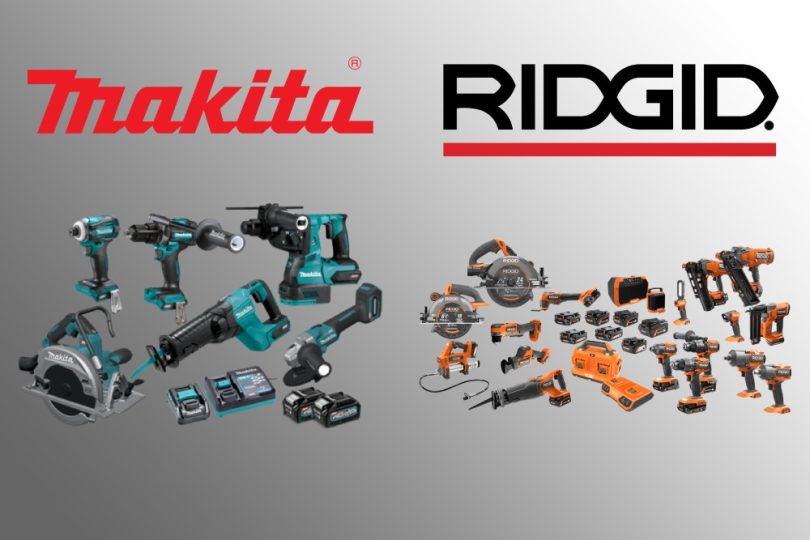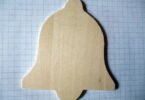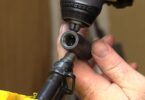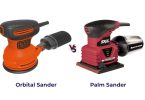Makita and Ridgid are both established brands that have been dominating the hand and power tool industry for some time.
Since both of their products fall into the same category in terms of pricing, quality, performance, and reliability, it’s really hard even for a seasoned craftsman to decide which brand they should buy their tools from.
Let’s get to know more about them and what exactly they have in offer for the different types of artisans out there.
Ridgid – A Brief Overview
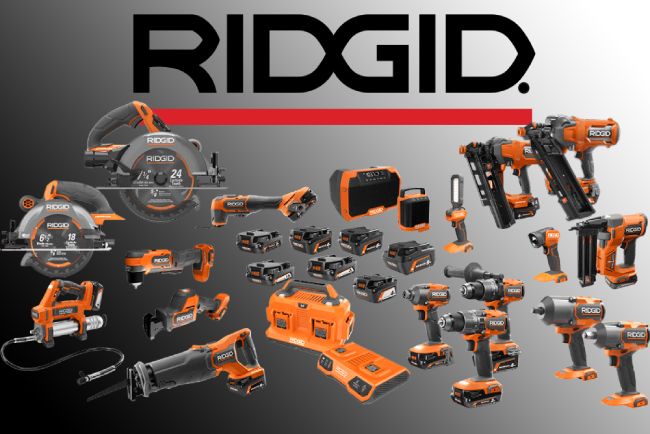
In 1923, Ridgid started their journey in North Ridgeville, Ohio but they moved to Elyria, Ohio in 1943.
Now, their mother company is Emerson Electronics, which bought Ridgid in 1966.
Ridgid now manufactures a variety of tools; i.e., 300 types in total, especially plumbing, construction, pipe fitting, and HVAC tools. The iconic modern red pipe wrench helped them gain worldwide popularity and a household name in the US.
They also offer power tools and wet/dry vacuums manufactured by Techtronic industry (TTI) and Emerson Electronics respectively.
Makita – A Brief Overview
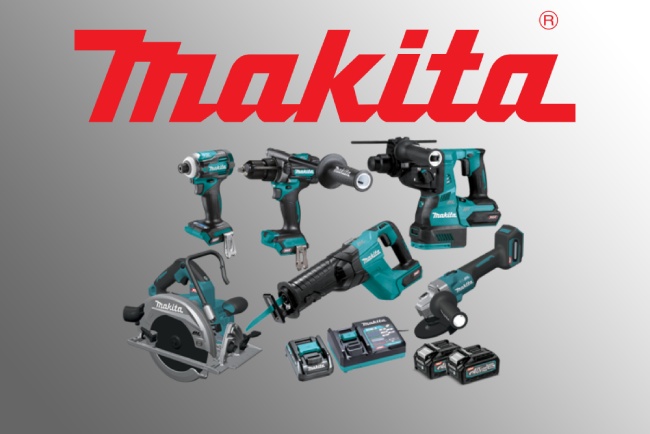
Makita Corporation was founded by Mosaburo Makita on March 21, 1915 in Nagoya, Aichi, Japan.
Now, they have factories in China, Brazil, Japan, Romania, Mexico, Germany, the UK, Thailand, United Arab Emirates, and the United States. But their headquarters are located in Anj?, Japan.
Repairing and selling motors, lighting types of equipment, and transformers were their first targeted products to manufacture. In fact, they were the first to introduce electric planers in 1958.
Later, they stepped into the power tool industry in 1959. The first battery-operated drills with a rechargeable facility were also introduced by them in 1969.
Ridgid vs Makita: Head-To-Head Comparison
Here’s a quick look at their differences
| Comparing factors | Rigid | Makita |
| Specializes in | Plumbing products | Crafting rechargeable tools |
| Product line | Less in number | More in number |
| Combo kits | Only 7 kits available now | A lot of options available |
| Product quality | Good enough | Even better |
| Manufacturing facilities | Less in number | More in number |
| Battery ampere | 4Ah | 5Ah |
| Reciprocating saw strokes | 3,000/minute | 2,800/minutes |
| Hammer drill torque | 780 lbs | 480lbs |
| Impact driver torque | 2,000 lbs | 1460 lbs |
| Warranty | 3-year warranties, limited lifetime warranties, and lifetime service agreements. | 1, 2, and 3 years |
| Price | Less expensive | More expensive |
1. Manufacturing facilities
Ridgid
The red pipe handle that Ridgid uses in their tools are made in a factory located in Ohio, USA. This facility also manufactures a few other hand tools.
The Hong Kong-based TechTronic Industry (TTI) manufactures most of their stationery, benchtop, handheld, and power tools like drills, saws, and sanders.
On the other hand, the Germany-based Metabo manufactures four of their tools. Ryobi routers are crafted in South Carolina, USA while wet/dry vacuums and a few other tools are manufactured by Emerson Electronics.
All the other tools except for the above ones are manufactured in either China or Taiwan.
Makita
Makita has manufacturing facilities all across the globe. Only 10% of their products are made in Japan.
The rest are made in different factories located in 30 different countries, including China, Brazil, Japan, Romania, Mexico, Germany, the United Kingdom, Thailand, the United Arab Emirates, the United States, and more.
They currently have over 13,000 employees worldwide.
2. Product portfolios
Ridgid
Although Ridgid mainly focuses on plumbing products and doesn’t have a wide range of offerings like Makita, they also have a large variety of products with almost 50 different models that include all the essential tools for newbies and homeowners with some DIY skills.
Products like corded tools, diagnostic equipment, pipe threading equipment, drain cleaning tools, wet/dry vacuums, and hand tools are also in their selection.
What’s more, Ridgid offers special plumbing tools like bending, pipe cutting, and forming equipment. They also have a wide number of fabrication and threading tools, which include different types of electric and manual snakes for pipe cleaning.
In the accessories department, you will find different types of plumbing equipment like crimps and specific electric tools.
Makita
Makita also boasts a large power tool selection but their specialty lies in crafting rechargeable tools since they have over 50 types of cordless tools, including blowers, drills, jigsaws, circular saws, miter saws, band saws, routers, die grinders, sanders, and even coffee makers.
They also have corded versions of these products and there are different models in each category to choose from.
A collection of saw blades and drill bits are available in their stores and online platform in the “Accessories” section. As for construction tools, they have protective equipment and heated vests to help protect construction workers from danger.
They began manufacturing rechargeable tools two decades before any of their competitors and many of today’s power tool battery technologies have been invented by them.
3. Price
Ridgid
Ridgid’s price range is slightly lower than Makita. A large number of tools from Ridgid cost $100 or less. Some worth mentioning are the R8606B orbital sander, R86116 cordless drill, and R8694220B spotlight.
The drain cleaning machines from Ridgid are usually costly, such as the 71722, 35473, and 58960.
Makita
You can buy cordless power tools from Makita for less than $100. Some examples are the RT0701C router, XOB01Z orbit sander, XPH12Z brushless drill, and XRJ01Z reciprocating saw.
Makita’s expensive tool range like the XCU03PT1 chainsaw, XBU02PT1 blower kit, and HM1307CB demolition hammer can cost more than $300.
They also sell combo kits, which are really expensive but if you buy them, you can save money as the kits cost less than the total individual prices of the tools.
4. Warranty
Ridgid
Ridgid has many warranty schemes for their products, such as 3-year limited warranties, 3-year warranties, limited lifetime warranties, lifetime service agreements, and full lifetime warranties.
Their hand tools usually come with a lifetime warranty. Since 2004, all the power tools have been facilitated with a 3-year warranty. However, there are options for lifetime service agreements for replacement batteries, free parts, and services.
Ridgid’s lifetime warranty policy allows you to return the tool if it fails to meet any of your expectations.
Makita
Makita has 3 different warranty periods – 1, 2, and 3 years. They cover most of their tools with a 1-year warranty but those related to emission have 2 years of warranty, which covers air induction, fuel metering, and ignition systems.
Some products like batteries, pneumatic nailers, and chargers have a 3-year warranty. Makita also gives a 30-day money-back guarantee for all of their products.
5. Customer service
Ridgid
You can contact a Ridgid customer representative at any time who will ensure your satisfaction by providing excellent service and the parts you need to solve your problem.
The only problem is that they can sometimes be late to send the necessary parts, which can add to the downtime of your production line.
Makita
Makita also has excellent customer service and representatives who can effectively solve your problems by carefully listening to you. They are usually quick (e.g. 1 or 2 days) to deliver the required parts.
The downside of Makita’s customer service is that sometimes it is hard to get in touch with a representative as you may have to wait for some time or experience busy signals.
Sometimes you may also have to wait to receive the parts as they have different plants in different countries.
6. Power of tools
Ridgid
Ridgid tools use 18 volts of lithium-ion batteries. When talking about power, their impact driver, for instance, gives 2,000 lbs and the hammer drill gives 780 lbs of torque, while the reciprocating saw performs at 3,000 strokes per minute.
Makita
Makita tools also operate with 18 volts lithium-ion batteries. Their hammer gives 480 lbs of torque while the impact driver gives 1,460 lbs. You get 2,800 strokes per minute with their reciprocating saw.
7. Battery
Ridgid
As cordless tools usually come with batteries, two things need to be kept in mind – if the battery is long-lasting and how fast the charging capability of the charger and the tool is.
Rigid products have 4 Ampere hours (Ah) batteries, which means it will take some extra charging time when compared to Makita.
Makita
Makita is on the winning side as they have a higher ampere-hours battery (5 Ah) than Ridgid. As a result, their batteries take less time to be charged.
Another good side of Makita tools is that their batteries come with a special feature to reduce overheating during the recharge. This helps the battery’s health to remain good for a long time.
8. Quality
Ridgid
Ridgid’s pricing is simply outstanding when considering their overall quality and performance. Their main product line has great resiliency to wear and tear.
Many of their products are made in the US, which also ensures their top quality. Their hand tools often come in several parts that usually don’t add any extra cost to their price tag.
Makita
Makita also has a strict quality control policy and the manufacturing of their products is controlled by the headquarters located in Japan.
Their tools also come with quality build, high resilience to wear and tear, and reliable design.
9. Combo Kit
Ridgid
Ridgid combo kits come with a good number of tools and accessories to make your life a lot easier.
Their combo kits are available in seven different combinations now for cordless tools but that will increase over time as they have recently added three new combo kits.
To name a few – 18v 2-tool combo kit, 18V Brushless 3-Speed 1/4 in Impact Driver Kit, 18V SubCompact Brushless 1/2 in Hammer Drill Kit, 18V SubCompact Brushless Impact Driver Kit, 18V Brushless 4 Tool Combo Kit, and 18V Brushless 1/2 in Hammer Drill and Impact Driver Kit.
These combo kits contain impact drivers, hammer drills, reciprocating saws, circular saws, and flashlights. All these products run on an 18v battery.
You will also get batteries, chargers, auxiliary hands, circular saw blades, bits, reciprocating saw blades, wrenches, bags, and belt hooks.
The features include two times longer life, triple protection electronics, fuel gauge, and extreme weather performance.
Makita
In the case of the Makita combo kits, you will also get a number of tools and features. Unlike Ridgid, they have a large combo kit selection. Just think of your needs and you will surely find a kit made just for that.
With the Makita 18v Cordless Combo Kit, you get an impact driver, hammer drill, reciprocating saw, circular saw, and flashlight.
These kits also have batteries, blades, chargers, and bags to carry the different tools.
10. Impact driver selection
Ridgid
Ridgid offers a variety of impact drivers for different types of fabrication and construction work.
Although the drivers are fundamental in nature, they have a balanced design to grip easily and comfortably to use for extended periods of time. They are also capable enough to perform well in real-world jobs.
Makita
Makita impact drivers also have a wide range of impact driver selections to meet your household and business needs.
The biggest advantage of their full-sized impact drivers is they all have the same battery packs, which may lower your cost and hassle in some situations.
Another good side is that the drivers use brushless motors, which generate less heat. This results in fewer problems in different types of applications.
Ridgid vs Makita: Pros and Cons
Ridgid
Pros
- Quality products
- Reasonable pricing
- Reliable and durable tools
- Different warranty schemes
- Several safety features
- Capable to handle professional use
- User-friendly design
- Slightly cheaper than Makita
- A bigger collection of plumbing tools
- Satisfactory customer service
Cons
- Usually heavy tools
- Very few numbers of general-use drills
- Air compressor quality is not good enough
- Fewer manufacturing facilities
- Limited product varieties
Makita
Pros
- Better product quality than Ridgid
- Durable and reliable
- Higher battery ampere-hours (5 Ah) than Ridgid
- A wider range of product selection
- Better quality impact drivers
- Reasonable pricing
- More manufacturing facilities
- Great customer service
- Better power and performance
- Well designed tools
Cons
- The warranty periods are not as good as Ridgid
- Slightly more expensive than Ridgid
Ridgid vs Makita: Which One to Choose?
They both are popular brands worldwide with a rich selection of power and hand tools.
However, Makita proudly boasts a larger variety of tools. Many think their products have more power and offer better performance when compared to Ridgid and other top players in the industry, such as Dewalt and Milwaukee.
For budget-conscious buyers, Ridgid can be your go-to choice as they are slightly cheaper and have better warranty periods.
Ultimately, it all depends on you! We hope you will make the right choice based on your needs, skills, and budget.
Good luck!

